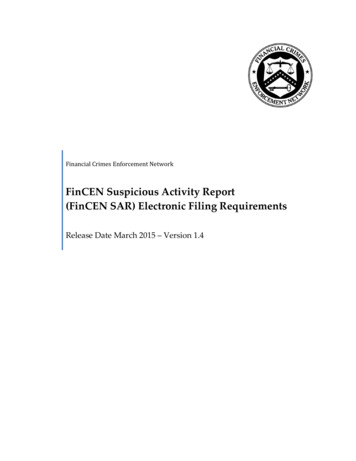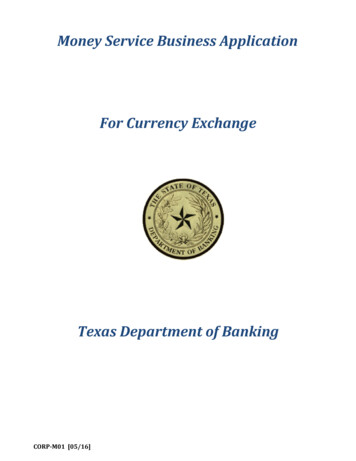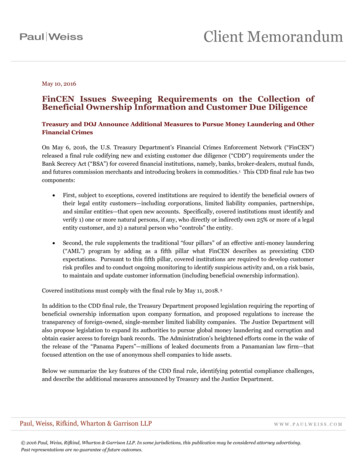
Transcription
Fact Sheet for FINCEN Geographic Targeting OrdersThe Financial Crimes Enforcement Network (FinCEN), a bureau of the U. S. Departmentof Treasury, issued Geographic Targeting Orders to all title companies. The ordersimpose temporary new data collection and reporting requirements for all cashpurchases of residential real estate by corporate entities in certain counties. Under theOrder, title companies, including any subsidiaries and agents of (“Covered Business”),must report the names of all natural persons with 25% or greater ownership interest ina legal entity.This reporting requirement starts September 22, 2017 and ends March 20, 2018. Sample OrderRead FinCEN’s press releaseRead ALTA’s background articleCovered JurisdictionsCaliforniaLos Angeles - 2 millionSan Diego - 2 millionSan Francisco - 2 millionSan Mateo - 2 millionSanta Clara - 2 millionFloridaBroward - 1 millionMiami-Dade - 1 millionPalm Beach - 1 millionTexasBexar - 500,000HawaiiHonolulu - 3 millionNew YorkBronx - 1.5 millionBrooklyn - 1.5 millionManhattan - 3 millionQueens – 1.5 millionStaten Island - 1.5 millionI. The BasicsWHAT IS FINCEN?Established in 1990, FinCEN is a bureau of the U.S. Department of the Treasury. Its mission is“to safeguard the financial system from illicit use and combat money laundering andpromote national security through the collection, analysis, and dissemination of financialintelligence and strategic use of financial authorities.” FinCEN fulfills its mission by receivingand maintaining financial transactions data, analyzing and disseminating that data for lawenforcement purposes, and building global cooperation with counterpart organizations inother countries and with international bodies. FinCEN’s authority comes from the Currencyand Financial Transactions Reporting Act of 1970, as amended by Title III of the USA PATRIOTAct of 2001 and other legislation. This legislative framework is commonly referred to as theBank Secrecy Act (BSA).WHAT IS THE BANK SECRECY ACT?The Bank Secrecy Act (BSA) is the primary U.S. anti-money laundering (AML) law and tool for detecting, deterringand disrupting terrorist financing networks. The BSA authorizes the Secretary of the Treasury to issue regulationsrequiring banks and other financial institutions to take a number of precautions against financial crime, includingthe establishment of anti-money laundering programs and the filing of reports that have been determined to have
a high degree of usefulness in criminal, tax, and regulatory investigations and proceedings, and certain intelligenceand counter-terrorism matters. See 31 U.S.C. 310.WHAT IS MONEY LAUNDERING?Money laundering is the process of disguising financial assets produced through illegal activity. Through moneylaundering, the monetary proceeds derived from criminal activity are transformed into funds with an apparentlylegal source.II. Geographic Targeting OrdersWHAT IS A GEOGRAPHIC TARGETING ORDER (GTO)?Under the BSA, the director of FinCEN can issue orders imposing additional recordkeeping and reportingrequirements on domestic financial institutions or non-financial trades or businesses in a specific geographic areafor transactions involving certain amounts of United States currency or monetary instruments. These orders can bein effect for up to 180 days. See 31 U.S.C. § 5326(a); 31 C.F.R. § 1010.370.HOW IS A GTO DIFFERENT FROM CASH TRANSACTION REPORTING?Under the internal revenue code, a business does not need to report a cash transaction or multiple relatedtransactions unless more than 10,000 in currency is received. Under a GTO, FinCEN can lower this threshold forcertain Covered Business and certain Covered Transactions. Both cash transaction reporting and GTO reporting aremade to the government using versions of the IRS form 8300.CAN A GTO BE RENEWED AFTER THE INITIAL 180 DAY PERIOD?Yes. GTOs can be renewed by the director of FinCEN following a finding that the circumstances justifying theoriginal GTO continue to exist.III. Details of the GTO’sWHAT ARE THE EFFECTIVE DATES OF THE GTO?The GTO goes into effect on September 22, 2017 and ending on March 20, 2018.WHO IS SUBJECT TO THE GTOS?All title insurance companies received the Geographic Targeting Order. The order applies to title insurers, theirsubsidiaries and agents (“Covered Business”).WHAT TYPES OF TRANSACTIONS MUST THE COVERED BUSINESS REPORT?A Covered Business must report any transaction that involves each of the following elements:1.2.3.4.The buyer must be a Legal Entity, defined under the GTO as a corporation, limited liabilitycompany, partnership or other similar business entity, whether formed under the laws of a stateor of the United States or a foreign jurisdiction;Residential real property located in the subject counties;For a purchase price of above a specific threshold in each county;Without a loan or similar form of external financing from a financial institution; and
5.Any portion of the purchase price is paid using currency, cashier’s check, certified check,traveler’s check, money order, personal check and bank check.HOW LONG DOES A COVERED BUSINESS HAVE TO REPORT A COVERED TRANSACTION TO FINCEN?A Covered Business must report a Covered Transaction to FinCEN within thirty (30) days of the closing of theCovered Transaction.HOW LONG IS A COVERED BUSINESS REQUIRED TO RETAIN COVERED TRANSACTION RECORDS?All records related to compliance with the GTO must be retained for a period of five (5) years from the last day theGTO is effective. Under the terms of the existing GTO, a Covered Business would be required to retain suchrecords until March 20, 2023. However, should the GTO be renewed, all records related to compliance with theGTO must retained for five (5) years from the last day the GTO is effective pursuant to all renewals of the GTO.WILL THE GTO STOP REAL ESTATE TRANSACTIONS FROM CLOSING?The GTO is not intended to prevent real estate closings from taking place. The GTO is meant to allow the Treasuryto collect information about these transactions after the closing.VI. Reporting RequirementsWHAT INFORMATION MUST A COVERED BUSINESS REPORT ABOUT A COVERED TRANSACTION?A Covered Business must report a Covered Transaction to FinCEN using Form 8300, and include the followinginformation: Identity of the individual primarily responsible for representing the Legal Entity;A description of the identification (driver’s license, passport or other similar identifying document)obtained from the individual primarily responsible for representing the Purchaser with a copy retained inthe file;identity of the Purchaser and any Beneficial Owner(s) of the Purchaser’s;A description of the type of identification, driver’s license, passport or other similar identifying document,obtained from the Beneficial Owner with a copy retained in the file;Date of closing of the Covered Transaction;Total amount transferred in the form of a Monetary Instrument;Total purchase price of the Covered Transaction; andAddress of the real property involved in the Covered Transaction;Also include the term “REGTO” as a unique identifier for this GTO in the Comments section.DOES THE GTO DEFINE WHO IS A BENEFICIAL OWNER?A Beneficial Owner is an individual who directly or indirectly owns 25% or more of the equity interest in the LegalEntity.WHAT IF THE LEGAL ENTITY PURCHASING THE REAL PROPERTY IS OWNED BY ANOTHER LEGAL ENTITY?If the purchasing Legal Entity is owned by another Legal Entity, the GTO requires the reporting of informationabout the Beneficial Owners of any and all of the parent Legal Entities.
WHAT ARE THE PENALTIES FOR VIOLATING THE GTO?Violation of the GTO may subject a Covered Business to the following criminal and civil penalties:Criminal PenaltiesType of ViolationWillful violationWillful violation while violating another law of theUnited StatesStructuring or assisting in structuring a transaction toavoid the currency transaction reportingPenaltyUp to 250,000 fine and 5 years in prisonUp to 500,000 fine and 10 years in prisonFine and up to five years in prisonCivil PenaltiesType of ViolationWillful violation(a separate violation occurs for each day the violationcontinues and each location a violation occurs)Failure to file a report, material misstatement oromissionStructuring or assisting in structuring a transaction toavoid the currency transaction reportingNegligencePenaltyGreater of the amount involved (up to 100,000) or 25,000Not to exceed the amount involved in the transactionNot to exceed the amount involved in the transactionNot to exceed 500 or 50,000 if a pattern ofnegligence is foundCAN PENALTIES BE ASSESSED AGAINST A COVERED BUSINESS’ INDIVIDUAL EMPLOYEES OR AGENTS? Yes. Both civil and criminalpenalties may be levied against a partner, director, officer, agent or employee of the Covered Business.HOW LONG AFTER A VIOLATION CAN THE GOVERNMENT ASSESS A PENALTY?Penalties can be assessed any time within six years from the date of the Covered Transaction. Civil actions may becommenced within two years of the date of the penalty or criminal conviction.VII. Covered TransactionsDOES PRIVATE OR SELLER FINANCING QUALIFY AS “WITHOUT A BANK LOAN” UNDER THE GTO REPORTING REQUIREMENTS?Yes, the reporting exclusion is only triggered by loans financed by a financial institution that is required to have ananti-money laundering policy. If financing is provided by a private lender, seller or other business that does nothave a federal requirement to maintain an anti-money laundering policy, then the transaction is reportable.ARE THE REPORTING REQUIREMENTS TRIGGERED WHEN THE PURCHASE PRICE IS PAID ENTIRELY THROUGH A WIRE TRANSFER?Yes. The Countering America's Adversaries Through Sanctions Act of 2017 changed the law and makes transactionswhere the entire purchase price is paid via fund transfer reportable under the GTO.
WHAT IF ONLY A DE MINIMIS AMOUNT OF CURRENCY IS USED IN THE PURCHASE PAYMENT?If any amount of the purchase, including a de minimis amount, is funded by using currency, check, wire transfer orany one of the types of payment listed in the order, then it would be considered a Covered Transaction subject tothe reporting requirements of the GTO.VIII. Who must file a Form 8300?IS A TITLE INSURANCE AGENT, SETTLEMENT ATTORNEY OR REAL ESTATE AGENT REQUIRED TO REPORT COVERED TRANSACTIONS TOFINCEN?It depends. The GTO applies to title insurance companies, their subsidiaries and agents. It does not apply tobusiness involved in the Covered Transactions that are not agents of the title insurer, such as attorneys or realestate agents. While the definition of a Covered Business includes the insurer’s agents, only one report is requiredfor each Covered Transaction. Depending on the policy and procedures of the covered insurer, the report can befiled by either the insurer or their agent.IF THE COVERED BUSINESS JUST INSURED THE TRANSACTION BUT WAS NOT INVOLVED IN THE CLOSING, DOES IT NEED TO REPORT THETRANSACTION?Yes. A Covered Business must report the transaction whenever it, or its subsidiaries or agents, are involved in theCovered Transaction. This includes when they only provide title insurance and not settlement services in thetransactions.IX. Collecting information.CAN A COVERED BUSINESS RELY ON INFORMATION PROVIDED BY REAL ESTATE ATTORNEYS OR AGENTS WHEN REPORTING?Yes. For purposes of completing the FinCEN Form 8300, in addition to collecting information directly from thePurchaser or the Beneficial Owner(s), a Covered Business may collect information regarding the Purchaser ofBeneficial Owner(s), when made available by from the real estate agent or attorney involved in the CoveredTransaction.CAN AN ATTORNEY WITHHOLD CLIENT INFORMATION FROM THE TITLE INSURANCE COMPANY UNDER A CLAIM OF PRIVILEGE?No. Information necessary for completing a form 8300, Suspicious Activity Report or other Bank Secrecy Actreporting requirement cannot be withheld from the government due to attorney-client privilege. See United Statesv. Goldberger & Dublin, P.C., 935 F.2d 501 (2nd Cir. 1991), holding that absent special circumstances, attorneyswere required to disclose client information on Forms 8300. See also United States v. Leventhal, 961 F.2d 936 (11thCir. 1992), holding that state bar ethical rules do not constitute a “special circumstance” that would protect clients’names and fee arrangements from disclosure.
5. Any portion of the purchase price is paid using currency, cashier's check, certified check, traveler's check, money order, personal check and bank check. H. OW LONG DOES A . C. OVERED . B. USINESS HAVE TO REPORT A . C. OVERED . T. RANSACTION TO . F. IN. CEN? A Covered Business must report a Covered Transaction to FinCEN within thirty (30 .










